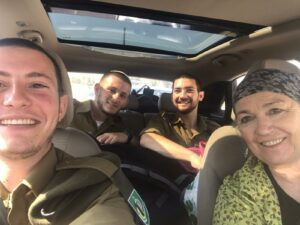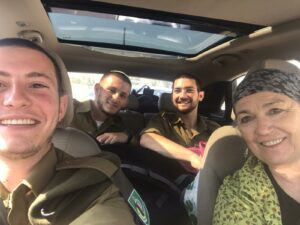
The un-official grandmother of the IDF and part-time Guardian of Israel
Yehudis Schamroth is many things to many people. She practices alternative medicine and is an experienced acupuncturist and Certified Registered Nurse Anesthetist (CRNA). But a surprisingly large group of lone soldiers know her as their unofficial “savta” (grandmother).officially an Israel365 Guardian of Israel,
Yehudis began her career as an IDF mother with her own son.
“I saw how much goes into taking care of a soldier,” Yehudis said. “Suddenly, doing his laundry and cooking his favorite food took on an entirely new dimension. I made sure that he made it to the train on time.”
Every Israeli knows how difficult it is to be a soldier in the IDF. After a physically and emotionally grueling week in army fatigues, soldiers are generally given half a day on Friday to travel home, a full day on Shabbat to recuperate, and are expected back on base Sunday morning. During that time, they are expected to launder their uniforms and carry out any personal chores. This is when ‘eema’ (mother) and ‘abba’ (father) are a vital part of the IDF, feeding and caring for their sons and daughters in uniform. For most IDF soldiers, a home-cooked meal and a clean uniform are just a bus ride away.
But lone soldiers are alone. They are typically new immigrants, unfamiliar with the language, and find simple tasks difficult. They have no friends, family, or community to call on for help.
That is where Yehudis steps in. When Yehudis began to meet loan soldiers, she couldn’t stand idle and not help.
“They volunteer and leave their homes to serve and protect us,” she said. “And they never ask for help or anything in return. They deserve to have a little extra care and attention.”
If they need something, she helps connect them with organizations that can help. Yehudis has been helping lone soldiers for years and in the meantime, several praiseworthy organizations have been established that help lone soldiers. But Yehudis provides the personal touch. If the soldier needs a ride to the bus or help to navigate the complex bureaucracy of Israel, she helps. And if they need a warm shoulder to cry on, she is there.

Photo courtesy Yehudis Schamroth
“I try to make their lives easier,” Yehudis said simply. “They might need a ride to the doctor or to the bank. Or they might need help sewing their patches on. There is no end to the little things that a mother or father usually does but these boys are on their own.”
Lone soldiers are a phenomenon unique to the IDF. In addition to young Israeli men and women who are required to serve, another 7,000 young men and women come from overseas to serve in the Israeli army.
They are highly motivated and idealistic with about 40% of them serving in combat units and almost one-quarter of these lone soldiers come from the US. During the 2014 Israel-Gaza conflict, three lone soldiers were killed, two from the US.
The pandemic hit lone soldiers especially hard. With international travel shut down, most of them did not see their families for over a year. Yehudis helped organize a “non-fourth of July barbecue” and a “giving thanks dinner.”
“Not all of the soldiers are from the US so we don’t make it exclusively American,” Yehudis said. “But these are the times when people usually are with their families. These are the times that the lone soldiers really miss their families.”
When Yehudis first began, she was known by the soldiers as the ‘minadevet eema’ (the volunteer mother) but lately, that has morphed into ‘mitnadevet savta’ (volunteer grandmother), a title that Yehudis doesn’t care for but one she is proud of. In truth, it is difficult to imagine referring to anyone with her energy and optimism as a grandmother so the title is more a reflection of the soldier’s needs than of her age.
In conjunction with Yeshivat Lev Hatorah in Bet Shemesh, Yehudis helps look after 40 lone soldiers. Yehudis is also a regular volunteer at a snack stand at Gush Etzion Junction that serves soldiers. The stand is run by volunteers and the snacks are free to all soldiers in uniform. Homemade cakes and cookies are provided along with hot and cold beverages.
It should be noted that Gush Etzion Junction, a busy section of the road about halfway between Jerusalem and Hebron, is a frequent target of terrorists. The soldiers who serve in the area, which includes the Cave of the Patriarchs, are under incredible stress, working hard to protect the Jews in the region.
Unofficially, Yehudis is involved with prayer groups.
“No one knows how to pray like the mother of a soldier,” Yehudis said. “The women of Bet Shemesh had a gathering once and when we introduced ourselves, some women had four or five children in the IDF. There aren’t enough hours in the day for one mother to pray for five sons in combat units.”
Yehudis also helped with girls doing national service who do not have families in Israel.
Israel in the News
